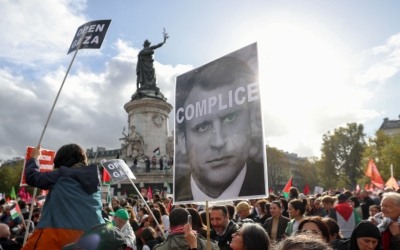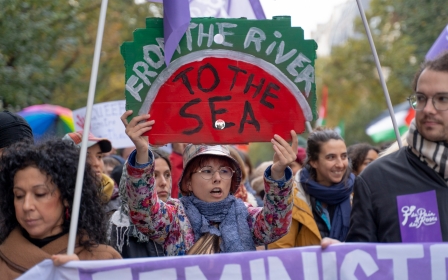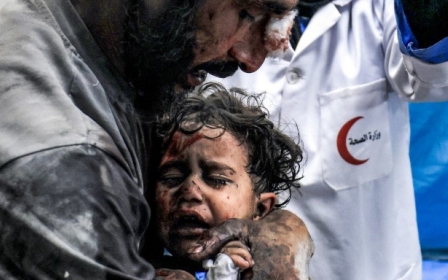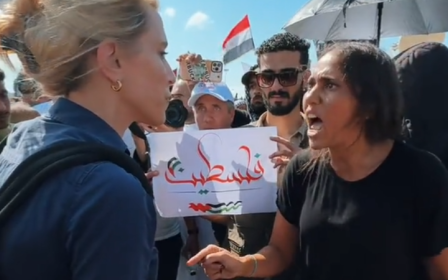Israel-Palestine war: France has become a silent accomplice in genocide
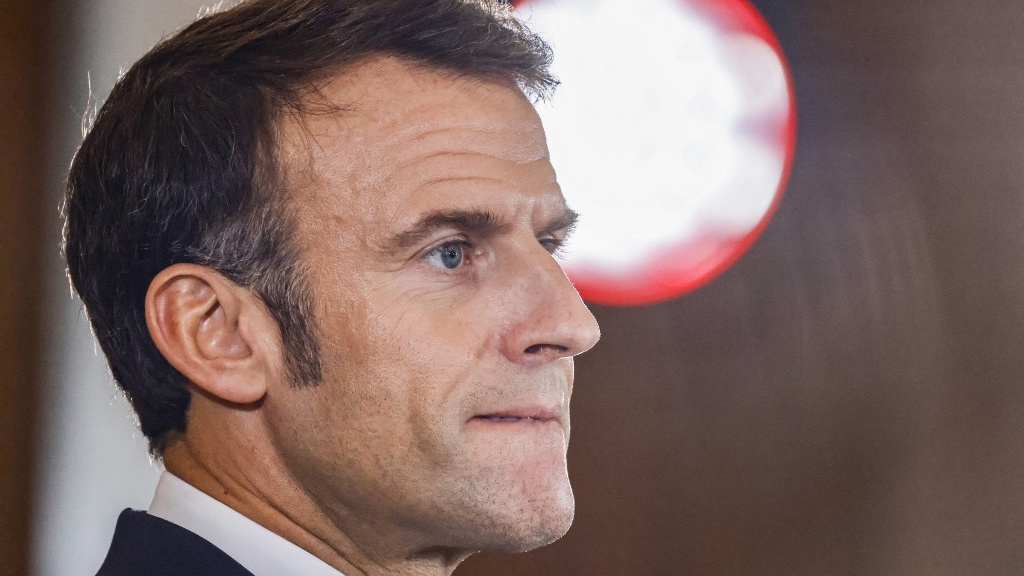
Since the start of Israel’s bombing of Gaza, the guiding principle for French President Emmanuel Macron has been unwavering and unconditional support for Tel Aviv.
Touting Israel’s “right to self-defence”, France on 16 October voted against a United Nations Security Council resolution that would have condemned violence against civilians. Paris subsequently supported a resolution that called for humanitarian pauses in Gaza, but it was vetoed by the US.
French President Emmanuel Macron has since gone further and called for a ceasefire, but this is too little, too late.
By strongly backing Israel, despite the disproportionality of the state’s response to the 7 October Hamas attack, France effectively gave the Israeli government licence to massacre of thousands of civilians.
There are no adequate words to describe the indecency displayed by leaders across the western world, who have continued to turn a blind eye to Israeli war crimes and genocidal actions in Gaza.
New MEE newsletter: Jerusalem Dispatch
Sign up to get the latest insights and analysis on Israel-Palestine, alongside Turkey Unpacked and other MEE newsletters
At the same time, the US, UK, France, Germany and other European countries continue to tout their humanitarian principles, in particular during the recent Gaza aid conference in Paris.
The tens of thousands of Palestinians killed and wounded by Israeli bombing in Gaza could have been saved, had these powers honoured their obligations to international humanitarian law. Instead, they have done the opposite, providing political, economic and military cover for Israel’s colonial and genocidal ambitions, while dehumanising Palestinians.
Limited space
Since Macron’s election, France’s authoritarian drift has been well documented, with anti-social policies, police violence and impunity, crackdowns on protests, and systemic Islamophobia, among other issues. The UN and other human rights observers have highlighted these failings.
If French foreign policy has not yet been analysed through the prism of this far-right turn, it is probably because such policy is generated outside of democratic and parliamentary controls. Though the General Assembly does have a say in foreign affairs, it rarely translates into concrete opposition: the constitution and the institutional practice grant the president very extensive powers regarding foreign policy.
The assembly's foreign affairs committee has little influence over foreign policy decision-making processes, and the legislative activity is limited in this area. So overall, the parliament has little opportunity to distance itself from the government on diplomatic issues, and has almost never done so.
Indeed, international affairs occupy a limited space within French political debates.
Follow Middle East Eye's live coverage for the latest on the Israel-Palestine war
In their blind support for an apartheid regime carrying out an ethno-nationalistic project of colonisation, the collusion of France’s political leaders with the far right is striking. Macron has even gone so far as to suggest expanding the mission of the global anti-Islamic State coalition to also target Hamas.
The western rejection of international law in the name of Israel's 'right to self-defence' plays into a virulent type of authoritarianism
Such a suggestion effectively decontextualises and conceals the reality of colonial occupation, conflating Palestinians with a global jihad in which they are not involved. This type of civilisational discourse, reminiscent of the neoconservative “clash of civilisations” theory, is based upon dehumanising, far-right rhetoric.
In addition, the western rejection of international law in the name of Israel’s “right to self-defence” plays into a virulent type of authoritarianism, promoting a worldview devoid of moral sense.
At the same time, France has taken steps to criminalise solidarity with the Palestinian people - which amounts to criminalising opposition to genocide - by banning protests, expelling activists and targeting anti-Israel boycott campaigns. In the current context, any criticism of government policy is framed as “terrorism”, a standard rhetorical process employed by authoritarian regimes.
Blind support
Meanwhile, the magnitude of recent Palestine solidarity protests has challenged classical theories that presume public apathy and indifference towards international conflicts. These mobilisations partially stem from the counter-hegemonic power of social media, which can disrupt dominant narratives and erode public authority.
In times of international crisis, the state has two tools to influence public opinion: control over public information, and policing certain segments of the population deemed to be “dangerous”. France is making use of both: the first through media concentration in the hands of a few billionaires, and the second by the repression of demonstrators.
Despite this, protests are continuing to expand, reflecting citizens’ deep rejection of French foreign policy - and their desire to place this policy at the core of the democratic debate.
France’s blind support for the Israeli military is a political choice and not a foregone conclusion, as shown by the diverging positions of other states, such as Ireland, Scotland and Spain. Even more striking has been the courage displayed by countries such as South Africa and Bolivia, who have used diplomatic levers to exert direct pressure on Israel.
Western media tends to belittle such reactions as “anticolonial sensitivity”, but in truth, they are evidence of a genuine and coherent commitment to human rights; a commitment to the institutional and legal applications of an international moral code. These countries point to the path forward.
There was once a time when France could boast about representing such a universalist commitment to human rights abroad. That time has clearly passed.
The views expressed in this article belong to the author and do not necessarily reflect the editorial policy of Middle East Eye.
This article is available in French on Middle East Eye French edition.
Middle East Eye delivers independent and unrivalled coverage and analysis of the Middle East, North Africa and beyond. To learn more about republishing this content and the associated fees, please fill out this form. More about MEE can be found here.



